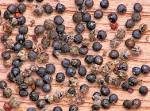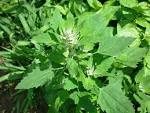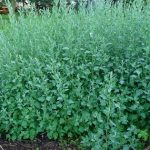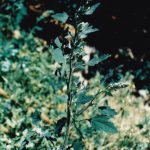Chenopodium album
Uses
India (Monghyr [Munger], Mirzapur, Dholpur, Alwar, Udaipur, Poona, and Ahmednagar; Bombay Presidency): leaves eaten as a famine food, typically boiled with salt and chili peppers; (Rajasthan, western): leaves eaten. China: stems, leaves and seeds eaten. Russia: seeds used for bread. Kenya: eaten by Nandi people, in Eldoret. Leaves boiled and water discarded.
he seeds of Chenopodium album contains around 13.12% protein and has a perfect amino acid balance with a high spectrum of lysine (59 g/kg) and methionine (21 g/kg) .
Additional Information
- Name Authority:
- L.
- Vernaculars:
- Bombay Presidency, Ahmednagar district, Sangamner: Chili. Poona and Ahmednagar districts: Chil. Rajasthan (western): Bathua, Bathusag. Bengali, Hindi: Botha -sag, Bethua -sak, Chandan -beta, Chakai. Sikkim: Kandrabe, Kato bethu, Kanda lathe. Assam: Palang, Tirrhye, Aghu, Aru, Jilmil. Punjab (plains): Bathua, Bathu, Jausag, Chulai, Lúnak. Chena Valley: Irr. Ladakh: Em. Uttar Pradesh: Bethuwa, Charai, Jau ság, Bhútwa. Santal: Bhatua arak. Hindi in Santal Perganas [sic]: Khartua sag. Bombay: Chakwit, Chil. Sindh: Jhil. Ali-Rajpur, C.I.: Chil -babra. Duk.: Khuljeh -ke -baji. Tamil: Parupa kire. Pappu -kura. Sanskrit: Vastuk. Arabic: Kulf. English: Pigweed, Goosefoot, White Goosefoot, Lambs Quarter
- Misc:
- Altitude: up to 14,000 feet (in Tibet). Chemical composition (Chinese samples): Protein = 16.1%. Fat = 6.87%. Carbohydrate = 48.85%. Ash = 5.8%. (Leafy stems): Protein = 3.9%. Fat = 0.76%. Carbohydrate = 8.93%. Ash = 3.0%. Chemical composition (after Hooper): Water = 78.00% (fresh). Fat = 4.53% (dry). Albumenoids = 22.14% (dry). Carbohydrates = 40.22% (dry). Fibre = 7.60% (dry). Ash = 25.51% (dry). Nitrogen = 3.54% (dry). Phosphoric acid = 1.35% (dry). Silicates = 2.00% (dry). Analysis of non-Chinese seed samples indicates that the seeds are a promising plant protein source, with a balanced amino acid pattern close to that of the hen's egg.



